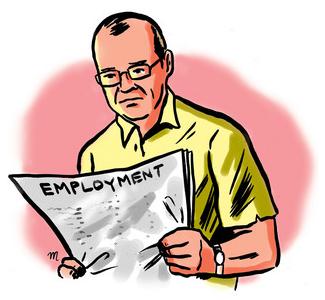- MENU
- HOME
- SEARCH
- WORLD
- MAIN
- AFRICA
- ASIA
- BALKANS
- EUROPE
- LATIN AMERICA
- MIDDLE EAST
- United Kingdom
- United States
- Argentina
- Australia
- Austria
- Benelux
- Brazil
- Canada
- China
- France
- Germany
- Greece
- Hungary
- India
- Indonesia
- Ireland
- Israel
- Italy
- Japan
- Korea
- Mexico
- New Zealand
- Pakistan
- Philippines
- Poland
- Russia
- South Africa
- Spain
- Taiwan
- Turkey
- USA
- BUSINESS
- WEALTH
- STOCKS
- TECH
- HEALTH
- LIFESTYLE
- ENTERTAINMENT
- SPORTS
- RSS
- iHaveNet.com

DEAR JOYCE:
I am a laid-off 37-year-old engineer. My dad is a laid-off 59-year-old executive. Not exactly the kind of bonding we'd planned on, but here we are. We've run across a book by Tom Jackson, "The Hidden Job Market," published in 1976. What's your view of this job-hunting strategy?
-- S.R.
The hidden job market concept targets unpublished jobs, as opposed to jobs that are advertised in media or on company Web sites, or disclosed through recruiters. You dig up undisclosed jobs through diligent, relentless networking. The strategy is effort-intensive, time-consuming, leads to many dead-ends and is more successful as a lifestyle than as an emergency campaign. Tag-teaming the challenge is an interesting idea.
IT COULD WORK FOR YOU.
Success rates in the hidden job market are debated by dispassionate researchers, but there's enough anecdotal evidence favoring savvy networking to give it a go. And when it works as intended and results in a good job -- jackpot!
Many career industry professionals have refined and commented on the concept of a hidden job market since Jackson popularized it in the mid-'70s, including the impressive Debra Feldman, an executive talent agent (jobwhiz.com) based in Greenwich, Conn. A rare breed, Feldman does the heavy lifting by designing and personally implementing search campaigns for senior-level executives.
Today's job market, with fewer open positions advertised and a short inventory for recruiters to fill, creates an especially fertile field for digging in the hidden job market, Feldman says.
SOURCE OF HIDDEN JOBS.
"Invisible jobs arise from a variety of circumstances," Feldman explains. "These include a leave of absence, unexpected retirement, employee resignation or termination, merger and acquisition activities, new products or services, opening of a new facility or territory, internal reorganization."
A new face may be hired for an existing position. Or a new staffing need may arise. An incumbent may be dumped to hire a specific individual who has pull or prior history with the decision-maker.
WHO KNOWS ABOUT HIDDEN JOBS?
"The hidden job market is accessed through people who know about openings, plans and employer needs," Feldman says. "These individuals primarily are employees, consultants, former employees, and may also include vendors, customers, business partners and others with inside connections. In today's marketplace, relevant news and unadvertised job leads are passed along among contacts -- by word of mouth and electronically on social networking sites, personal and corporate blogs, online and in-person support groups, and alumni networks."
There's much more to know about finding secret gems in the job market. Browse the topic and also see Feldman's Web site for more tips.
As Feldman says:
"It's not just what you know or even who you know, but who with the necessary authority to hire knows what you know, and how you can contribute to the organization's success."
DEAR JOYCE:
I get interviews but nothing happens after that. How important do you rate following up if you don't hear anything within a week?
-- P.P.
Following up on a job opening is as important as the air you breathe.
It's harder for an employer to say "no" on the phone than to turn you down by e-mail or in a tweet. But it's easier to reach an employer using digital access. The key to effective follow-up is establishing the employer's preferred frequency and mode of checking back before you leave the interview room.
The latest job figures reveal that the number of unemployed workers for every available job rose to 5.7, up from 5.5 the month before. Think of it: nearly six job seekers for every opening. Get busy and follow up.